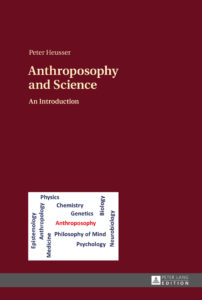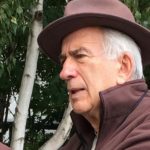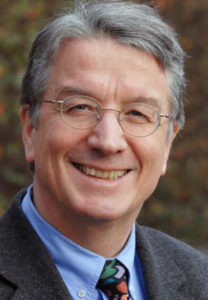Anthroposophy NYC Blog
MEETING OUR TIMES
Anthroposophy, Quantum Physics & Holistic Medicine’s Epistemology Crisis
Author: Walter Alexander, Contributing Writer for Holistic Primary Care News for Health and Healing®
This article was first published in the Holistic Primary Care News for Health & Healing®, Spring 2017, Vol 18, No. 1
www.holisticprimarycare.net
 Book Review: Peter Heusser, MD. Anthroposophy and Science (An Introduction), Peter Lang GmbH, 2016 English edition, transl. Lynda Hepburn.
Book Review: Peter Heusser, MD. Anthroposophy and Science (An Introduction), Peter Lang GmbH, 2016 English edition, transl. Lynda Hepburn.
Why would someone with a busy holistic practice pause to read a book with an arcane title, such as Anthroposophy and Science, and pages overflowing with—get ready—epistemology?
You’d first have to recognize that holistic medicine has an epistemology problem. Which it does. And this is not an academic matter—it has very real implications for practitioners and patients alike. In its simplest definition, epistemology is concerned with the origins, nature, and limitations of knowledge. In short, it’s about how we know what we think we know. When it comes to many facets of holistic medicine, this is not such a simple question.
The epistemology crisis came to light last November, when the Federal Trade Commission (FTC) announced plans to hold homeopathic products to the same standards of scientific evidence as other products (i.e. pharmaceuticals) making similar claims.
The FTC contends that for the vast majority of OTC homeopathics, “the case for efficacy is based solely on traditional homeopathic theories [from the 1700s], and there are no valid studies using current scientific methods showing the product’s efficacy.”
The latter clause echoes a statement on the National Center for Complementary and Integrative Health (NCCIH) website saying that there is little evidence to support homeopathy as an effective treatment for any specific condition.
Neither the FTC nor the NCCIH mentions the 2011 Swiss Health Technology Assessment (HTA) report outlining 20 of 22 systematic reviews favoring homeopathy, and the 24 out of 29 studies showing strong evidence for effectiveness in treatment of upper respiratory tract infection and allergic reactions.
The Swiss HTA report specifically discredited an earlier disparaging report in The Lancet (Shang A, et al. Lancet. 2005; 366(9487): 726–732), and concluded that homeopathy as practiced in Switzerland is effective, safe and cost-effective, and led the Swiss government to include homeopathy on the list of services covered by the Swiss statutory health insurance scheme after a five-year trial period that began in 2012.
If the NCCIH takes a dim view on homeopathy, it is only slightly more accepting of Ayurveda. The NCCIH’s website includes the statement: “Do not use Ayurvedic medicine to replace conventional care.” This might as well be generalized to most of all Asian medical systems and practices (Chinese medicine, acupuncture, osteopathy, chiropractic, yoga, tai chi, chi-gong, etc.).
These are the very things that NICCH is supposed to study. Since these forms of medicine generally involve non-patentable products and procedures, few other entities outside government institutions have the incentive or resources to undertake meaningful studies.
An Unreimbursed Netherworld
But, given the high price tag for trials, the anemic funding for institutes like NICCH, and a new administration that’s not likely to prioritize research on unpatentable medical alternatives, these modalities will not likely get any serious research attention in the future, and will remain forever marginalized.
Practitioners of these modalities are then relegated to a weakly reimbursable netherworld at the margins of healthcare, tolerated but always at the whim of capricious, overzealous watchdogs.
Mainstream medicine has a particular animus toward homeopathy, largely because its purported mechanism seems implausible to a reductionist science that demands that all explanations of biological life—and ultimately of psychic life—be reduced to chemical reactions found in inert matter.
Francis Crick, of double-helix fame, summed it up in 1994: “You[…] are in fact no more than the behaviors of a vast assembly of nerve cells and their associated molecules[…,] you’re nothing but a pack of neurons” (Francis Crick. The Astonishing Hypothesis. The Scientific Search for the Soul. Simon & Schuster Ltd., London).
This view is hardly “holistic;” it is instead “part-istic”—or as we call it—reductionist, a view of life as assembled from below up.
More and more, the reductionist model is being contradicted from many quarters, from quantum physics to open systems biology. Current physics tells us that the “building blocks” with extension in space (protons, neutrons) turn out to be made of sub-particles (up- and down-quarks) without extension in space.
An October 2015 article by John Markoff in The New York Times underscored this shift. The piece detailed a Delft University experiment providing, “the strongest evidence yet” to support the collapse of the wave function, and the notion that, “matter does not take form until it is observed [or measured].”
Markoff goes on to say that particles can “exist simultaneously in two or more places. Once measured, however, they snap into a more classical reality, existing in only one place.”
An Emergent World
The kickers here are twofold: first, our Cartesian world of sense is precipitated from an interconnected world of greater but not yet manifest possibility, and second, the precipitant is our own consciousness.
This represents a 180-degree turn away from Crick’s “pack of neurons” picture. It suggests a choice: we can continue to assert a science that holds human understanding and consciousness to be an essentially irrelevant froth, an exudate of invisible molecular processes, or we can embrace one that recognizes them together as an evolving sense organ integral to the actual progress of the cosmos.
This latter choice doesn’t abnegate the molecular processes, but it does expand the frame of our thinking to allow that causation may be rooted in something beyond the molecules.
This is the threshold of holistic medicine’s epistemological crisis, and it’s where a seemingly esoteric book like Heusser’s Anthroposophy and Science becomes relevant.
Heusser who is director of the Centre for Integrative Medicine at the University of Witten/Herdecke, Germany, is one of the world’s leading scholars of anthroposophic medicine in its theoretical aspects as well as its clinical application.
In the book, Heusser clearly states that matter is not exactly “made up of parts.” Rather, the things we see as parts, when chemically combined, become “sublated” or submerged into a new whole. From this viewpoint, water is an emergent phenomenon that is as elementary as hydrogen or oxygen.
While hydrogen and oxygen are conditionally necessary for water, they are not causal, and once combined as water, they lose the individual qualities of hydrogen and oxygen. Moreover, the qualities and behaviors of water cannot be predicted from the qualities of oxygen and hydrogen taken by themselves.
“For every quantum,” Heusser writes, “there is a quale,” a perceived quality that is as essential as any part that is mathematically quantifiable. This aspect of emergence of new entities that are as primary as the components associated with their arising applies upward from cell to tissue, from tissue to organ, from organ to organism and to individualized being. At each level “all of these have their laws,” Dr. Heusser states.
A medical science that works with these laws, he recognizes, needs rigor and discipline every bit as much as a science that restricts itself to the mathematical and statistical.
Dr. Heusser explores in detail the problems inherent to clinical trials of integrative modalities, such as homeopathy. Truly treating the whole patient, he asserts, calls for a still objective but “cognition-based medicine” that encompasses the realities and subtleties of the individual patient as well as the elements revealed through an “evidence-based medicine.”
One of the unexpected and somewhat unwelcome children of post-quantum physics is the recognition that we, the world, and our cognition of it, are intimately and causally linked.
That is a lot to take in. In a sense, it is a reversal of an intellectual and scientific movement that began in the 1600s with Francis Bacon’s experimental inductive methods and the attempt to exclude subjectivity from science. This movement gained momentum with John Locke’s emphasis on the primary sensory qualities of outer things. In short, the history of Western medical science has been governed by the belief that the quantitative is inherently more valid than the qualitative.
As Heusser clearly explains, modern physics is upending this longstanding invalidation of the qualitative. It urges medical science to take an evolutionary step and turn much more of its vast powers toward truly investigating “holism,” the reality of organisms, their identities, and their interrelated systems as they affect health, illness and healing.
Anthroposophy and Science (An Introduction) surveys the development of western understanding of knowledge as it has informed science and medicine.
Rudolf Steiner (1861–1925), anthroposophy’s founder, was trained as a scientist, and allowed only qualified MD’s into his medical courses. Steiner asked always for disciplined observation and verification. On that foundation, he wished medical professionals to expand their understanding and perceptual capacities, and as clinicians to adopt a holistic and more nuanced view of factors affecting health, illness, and healing.
Peter Heusser’s narrative is thorough, clear, sometimes challenging, and often thrilling in its syntheses. As complementary/integrative practices step further out of the shadows, practitioners will be called upon increasingly to represent what they do in the face of both honest inquiry and fierce antagonism. Anthroposophy and Science (An Introduction) offers a bedrock support.
 Walter Alexander is a NYC-based veteran medical journalist, former teacher (public and Waldorf), and long-time, active Anthroposophy NYC member, currently the Vice President of the Council. His writing career has reflected lifelong interests in the life sciences and medicine, astronomy, music, literature, the visual arts, epistemology and consciousness studies. heartsmindsoul.com
Walter Alexander is a NYC-based veteran medical journalist, former teacher (public and Waldorf), and long-time, active Anthroposophy NYC member, currently the Vice President of the Council. His writing career has reflected lifelong interests in the life sciences and medicine, astronomy, music, literature, the visual arts, epistemology and consciousness studies. heartsmindsoul.com
 Peter Heusser, MD, is a medical doctor with a comprehensive experience in practicing, teaching, and research in anthroposophical medicine, first at the University of Bern and in Swiss national research projects. He is currently a senior professor for senior professor for medical anthropology, Chair of the Theory of Medicine, Integrative, and Anthroposophical Medicine, and a former director of the Institute for Integrative Medicine at the Witten/Herdecke University, Germany.
Peter Heusser, MD, is a medical doctor with a comprehensive experience in practicing, teaching, and research in anthroposophical medicine, first at the University of Bern and in Swiss national research projects. He is currently a senior professor for senior professor for medical anthropology, Chair of the Theory of Medicine, Integrative, and Anthroposophical Medicine, and a former director of the Institute for Integrative Medicine at the Witten/Herdecke University, Germany.

Keep in touch with eNews.
Click on the button below to subscribe to our news and program updates…
